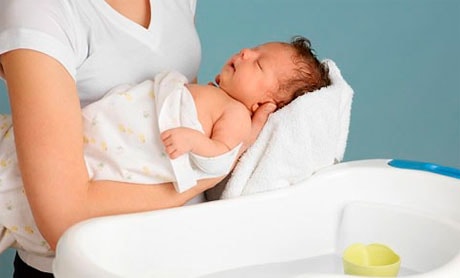Protect your baby in cold weather
Newborns have weak bodies and are at high risk of getting sick in cold weather. Parents need to pay special attention to caring for and preventing illness in newborns during the cold season.
Common diseases in infants in cold weather
Because newborns are still weak and their bodies are not yet able to stabilize and regulate their body temperature, when the weather turns cold, they are very susceptible to colds and typical diseases such as the following:
- Respiratory diseases: when newborns breathe, cold air also enters, making the baby's airways dry and susceptible to colds. In addition, because cold weather is a favorable environment for disease-causing viruses, especially viruses that cause infections in the ear, nose, and throat, newborns are at high risk of respiratory diseases such as colds, bronchitis, pneumonia, rhinitis...
- Skin diseases such as diaper rash, dry skin, dermatitis, atopic dermatitis... are caused by cold weather making the skin dry, not enough moisture on the skin so the skin is easily cracked and scratched. Due to cold weather, some parents are afraid that their baby will catch a cold, so they wrap and dress their baby in clothes that are too tight, making the baby's skin not ventilated, especially when the baby is kept too warm, the body temperature increases, sweat is not wiped away in time, causing itching and dermatitis. In addition, some parents are worried that their baby will catch a cold, so they do not change diapers or bathe their baby regularly, so the baby's skin is easily irritated in areas such as the groin, neck, armpits...
Pay special attention to keeping the head warm because the head is an area that easily loses heat.
Cold weather prevention for babies
For newborns, the best way for parents to prevent illness in the cold season as advised by doctors is to keep the baby warm, ensure hygiene and breastfeed if possible.
- Keep your baby warm: Newborns need to be kept warm because they cannot regulate their body temperature and cannot put on more clothes like adults or they are aware enough to tell you that they are cold, so parents need to:
+ Put a hat on your newborn baby, wear gloves, socks, and warm clothes for your baby, especially pay attention to keeping the head warm because the head is the place where heat is easily lost. However, you need to ensure that your baby's clothes are made from breathable, absorbent materials.
+ Do not let your baby lie in a drafty place, the room must be well ventilated.
+ If it's too cold, you can help your baby keep warm by using body heat transfer, direct skin contact between mother and baby so that your body heat is transferred to your baby.
+ Bathe your baby with warm water, prepare towels and other necessary items to avoid wasting time when bathing. Be careful not to bathe your baby for too long, when bathing, pay attention to areas such as the neck, armpits, groin, and genitals. After bathing, quickly dry and keep your baby warm.
Help your baby stay safe and healthy through the cold winter.
- Cleanliness:
+ When the weather is cold, it is not necessary to bathe your baby every day, but you need to pay attention to skin hygiene. You can use warm water to wipe your baby instead of bathing him every day like in hot weather.
+ Because newborns often urinate a lot, parents need to pay attention to changing diapers regularly to maintain hygiene and prevent the baby from catching a cold from urine.
- Breastfeed your baby (if possible) because breast milk contains antibacterial substances that help increase resistance and effectively fight infections. During breastfeeding, the mother will hold the baby in her arms, thereby helping to transfer her body heat to the baby, helping to keep the baby's body warm.
MD (ST)






